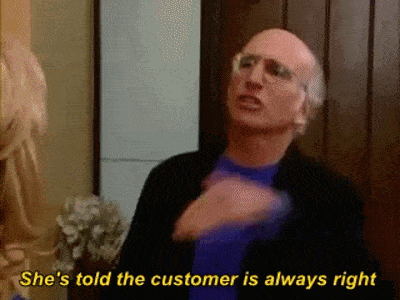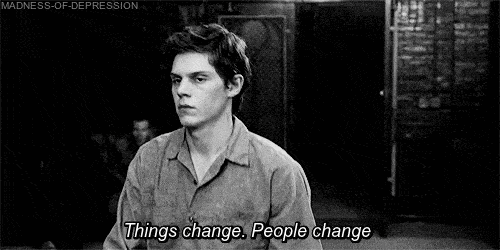-
 8 min. read
8 min. read
-
 Trevin Shirey
Trevin Shirey VP of Marketing
VP of Marketing
- Trevin serves as the VP of Marketing at WebFX. He has worked on over 450 marketing campaigns and has been building websites for over 25 years. His work has been featured by Search Engine Land, USA Today, Fast Company and Inc.
If you’re an experienced marketer, you’ve heard of generational marketing. You’ve probably read about the differences between Baby Boomers, Generation X, Millennials, and Generation Z. You’ve probably also read about how they collectively control almost all of the money in the world.
A lot of marketers have started appealing to these different groups of consumers based on their generational identities over the past few years, too. Just Google “marketing to millennials” and you’ll see what I mean. So after a couple years of doing this, it’s time to ask ourselves — as marketers, does it actually make sense to market specifically to generations?
Watch the video (and then keep reading) to get the answer.
The answer is…no.
In fact, marketers everywhere should stop it. Just stop it. Give me your keyboard.
Why generational marketing doesn’t work
When it comes to Millennial, Gen X, or Gen Z marketing, generational marketing tends to have a lot of problems.
Some of these problems deal with how generational marketing is framed, and others deal with how marketers use generational information. But it all boils down to the same basic issue: It’s just not trustworthy.
Problem #1. No one agrees when generations begin or end
 As this article from The Atlantic points out, no one’s sure when each generation actually starts and ends. And as this article from The Sydney Morning Herald shows, no one’s really sure how long generations even last. (You’ll notice people don’t have much nice to say about specific generations either.) Clearly, this is a huge problem.
As this article from The Atlantic points out, no one’s sure when each generation actually starts and ends. And as this article from The Sydney Morning Herald shows, no one’s really sure how long generations even last. (You’ll notice people don’t have much nice to say about specific generations either.) Clearly, this is a huge problem.
If someone’s telling you that you need to appeal to a group of people, you need a concrete idea of who’s actually in that group. Your marketing team could already have its own dates for different generations. But even if you have those dates ironed out, there’s still a much easier solution to this problem.
Solution #1. Market to age brackets
 The simplest solution to this problem is to break your audience into age brackets instead of generations. This lets you create campaigns that target a consistent audience of people who share a common and measurable quality — age. You can use metrics from Google, Facebook, and other marketing analytics programs to see how well your brand performs with different age groups.
The simplest solution to this problem is to break your audience into age brackets instead of generations. This lets you create campaigns that target a consistent audience of people who share a common and measurable quality — age. You can use metrics from Google, Facebook, and other marketing analytics programs to see how well your brand performs with different age groups.
And those age groups give you a lot of helpful information about your best customers and where you can improve. If your company wants to tap into the profitable 18-24 demographic, run some consumer tests to see if those people are in your customer base in the first place. If they’re not, get your marketing team to figure out how you can attract young, passionate customers.
Problem#2. It’s based on stereotypes
 Another problem with generational marketing is that it’s almost entirely based on stereotypes or observations from people outside the generations they’re talking about. This is a stark contrast from age brackets, where you can determine customer preferences with data. One of the most complete visualizations of these stereotypes is a chart from West Midland Family Center.
Another problem with generational marketing is that it’s almost entirely based on stereotypes or observations from people outside the generations they’re talking about. This is a stark contrast from age brackets, where you can determine customer preferences with data. One of the most complete visualizations of these stereotypes is a chart from West Midland Family Center.
This chart breaks the four working generations into columns and lists their traits — without any sourcing of how those traits were determined. In fact, if you compare that list with others on the Internet, you could see an entirely different set of qualities and even contradicting ones. So why can’t anyone completely agree on what generations show what traits?
In short, values don’t come from when you’re born. Values come from parents, peers, geography, economics, occupational history, nationality, religion, education, rewards, punishments, the aging process, and a lot of other factors. That means there’s no real way to target an entire generation with one sweeping marketing strategy.
You have to appeal to them as people with certain sets of values, just like you would with any other customer. With that in mind — and no data to back up any claims of generational values — reading about the traits of different generations is about as reliable as reading your audience’s horoscopes. Plus, some generational traits are universal.
Millennials are famous for wanting instant gratification, but if you’ve ever seen a Baby Boomer use iTunes for the first time, you know that desire is common across the board. People want what they want, they want it easily, and they want it fast.
Solution #2. Market according to your customers’ preferences
 Instead of basing your marketing strategies on stereotypes in popular ideology, you should use customer data instead. Preferably, this data would come straight from your marketing team’s observations through your analytics platform (like Google Analytics) and your lead tracking software (like MarketingCloudFX). These are two of the most reliable sources you have at your disposal when you want to learn more about your customers.
Instead of basing your marketing strategies on stereotypes in popular ideology, you should use customer data instead. Preferably, this data would come straight from your marketing team’s observations through your analytics platform (like Google Analytics) and your lead tracking software (like MarketingCloudFX). These are two of the most reliable sources you have at your disposal when you want to learn more about your customers.
You could also commission a market research company to do this if your business doesn’t have the man hours to spare. Regardless of how you go about acquiring the data, your next step is to apply it to your business. So if you notice that your website is getting some traffic from a niche you’re not intentionally targeting, create some new content or take out a few PPC ads to test the waters further.
Similarly, if you see that a marketing strategy you just introduced has a huge ROI, double down and make the most of it! With concrete, reliable data behind you, you don’t have to rely on “best guesses” from unsourced generalizations — your customers have already shown you what you need to know to earn more revenue.
Problem #3. It focuses on changing groups instead of static demographics
 The ultimate problem with generational marketing is the same problem that underlies most of life — people change. Like we mentioned above, one of the determining factors of a person’s values is their age. That means someone who’s 20 years old probably won’t have the same values when they’re 50. In fact, your personality constantly changes over time. So if you’re marketing to Millennials, you’re appealing to a group of people who collectively change as they age. That means in 10 years, you won’t be talking to 20-30 year olds — you’ll be talking to 30-40 year olds.
The ultimate problem with generational marketing is the same problem that underlies most of life — people change. Like we mentioned above, one of the determining factors of a person’s values is their age. That means someone who’s 20 years old probably won’t have the same values when they’re 50. In fact, your personality constantly changes over time. So if you’re marketing to Millennials, you’re appealing to a group of people who collectively change as they age. That means in 10 years, you won’t be talking to 20-30 year olds — you’ll be talking to 30-40 year olds.
That’s a huge change in age that represents tons of different lifelong variables. Over those 10 years, people mature, buy houses, get married, and have kids — some of the biggest parts of life happen in your 20s and 30s. In a nutshell, that means you can’t expect the same results from the same people from year to year.
Your client base today won’t be made of the same people 10 years from now even though they’re still members of the same generation. The worst part about this is that even if you have data to back up generational marketing now, it won’t apply in the future. Fortunately, the solution to this problem is pretty straightforward.
Solution #3. Focus on data like age and location
 If you want to get the most from your audience, you have to look at data to determine quantifiable trends that you can use for marketing purposes. That data can include the following:
If you want to get the most from your audience, you have to look at data to determine quantifiable trends that you can use for marketing purposes. That data can include the following:
- Age brackets (as we mentioned before)
- Gender
- Income
- Geographic location
- Interests
- Behavior on your site or in your business
- How they interact with your business (online vs. brick and mortar)
- How they move through your sales funnel
This kind of data will yield much more success than looking at whole generations and marketing to them as they age. Why? Because data is the great equalizer in marketing.
If you have data to back up an idea, you know it’s a good idea. If you can’t find supporting data, you know it’s questionable. This also fills in the gap of generations changing as they age.
It’s true that marketing changes every day, but it’s much easier (and more helpful) to track the behavior of your current customers as they buy from you.
Do you market to generations?
How do you run your marketing? Have you found success with generational marketing, or do you prefer data-driven results? Let me know in the comments!
-
 Trevin serves as the VP of Marketing at WebFX. He has worked on over 450 marketing campaigns and has been building websites for over 25 years. His work has been featured by Search Engine Land, USA Today, Fast Company and Inc.
Trevin serves as the VP of Marketing at WebFX. He has worked on over 450 marketing campaigns and has been building websites for over 25 years. His work has been featured by Search Engine Land, USA Today, Fast Company and Inc. -

WebFX is a full-service marketing agency with 1,100+ client reviews and a 4.9-star rating on Clutch! Find out how our expert team and revenue-accelerating tech can drive results for you! Learn more
Try our free Marketing Calculator
Craft a tailored online marketing strategy! Utilize our free Internet marketing calculator for a custom plan based on your location, reach, timeframe, and budget.
Plan Your Marketing Budget

Maximize Your Marketing ROI
Claim your free eBook packed with proven strategies to boost your marketing efforts.
Get the GuideTry our free Marketing Calculator
Craft a tailored online marketing strategy! Utilize our free Internet marketing calculator for a custom plan based on your location, reach, timeframe, and budget.
Plan Your Marketing Budget






